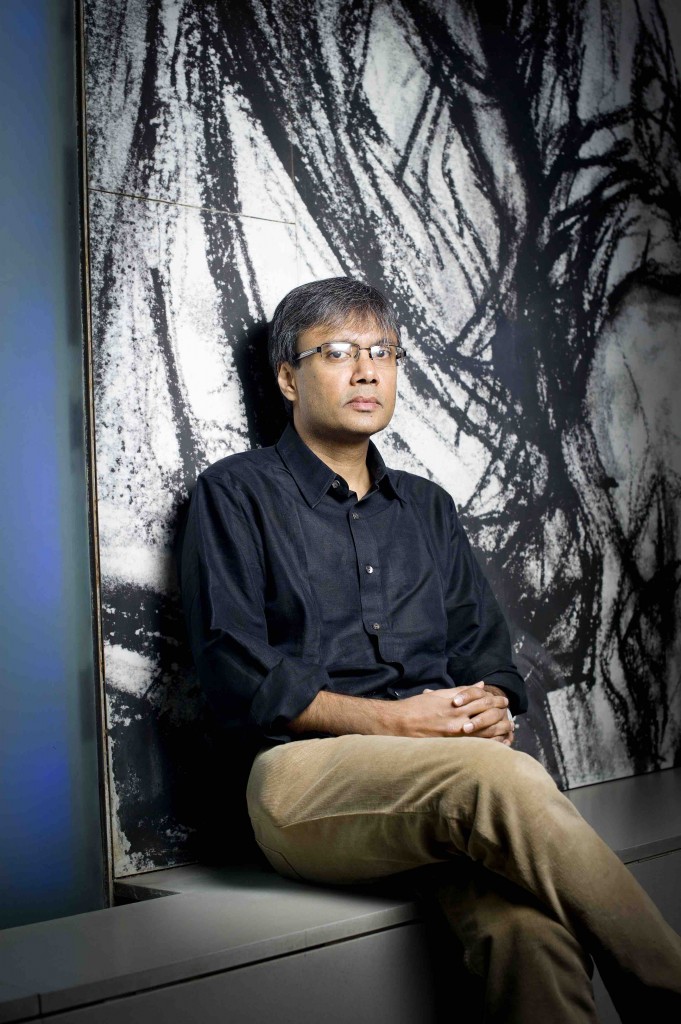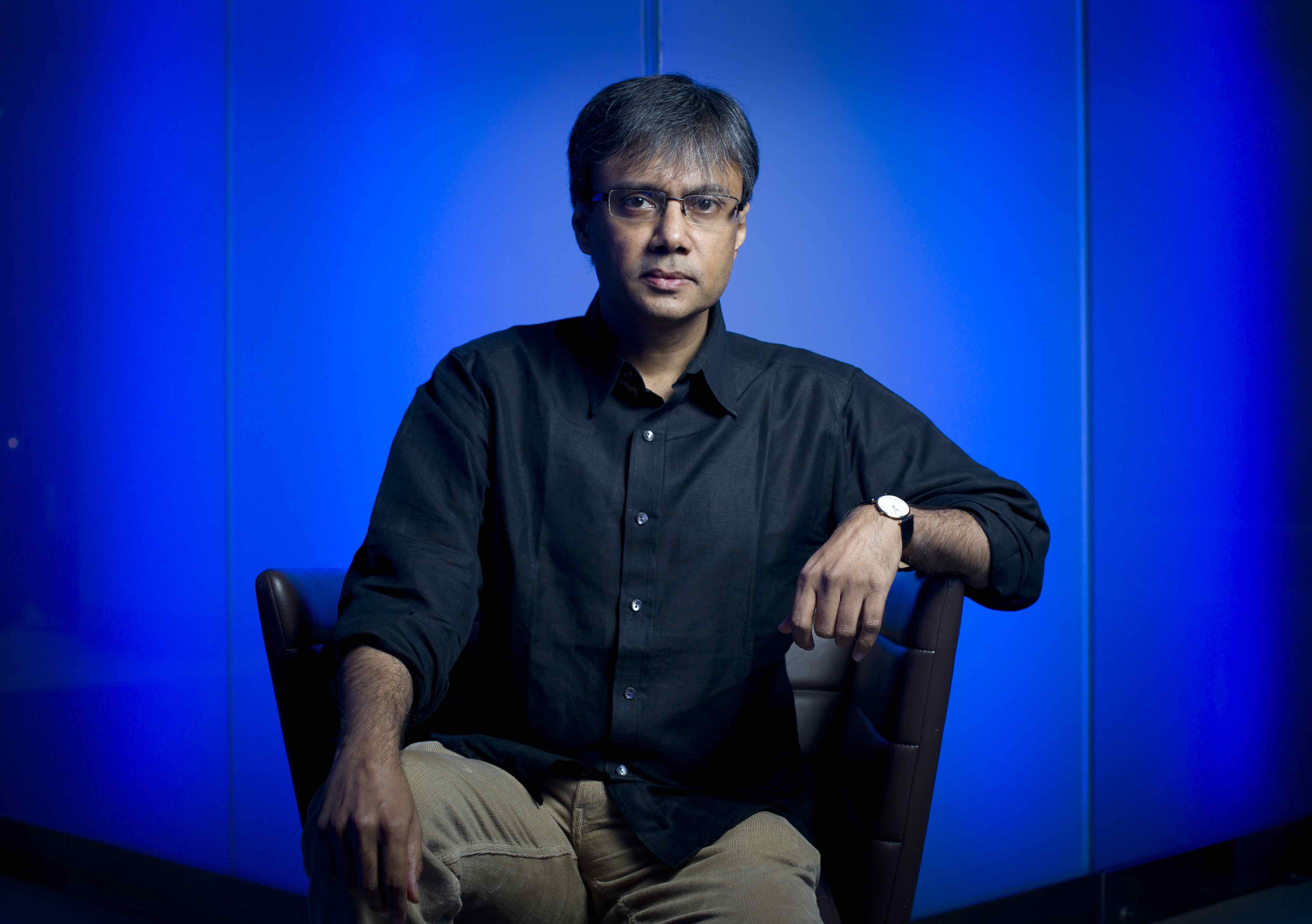I don’t think it makes sense to do something that one doesn’t love doing… god knows pursuing what you like is going to be hard enough! But if you’re pursuing something that is boring to you fundamentally, then I think that’s doubly difficult, no matter whatever the material rewards are at the end of that pursuit.
Growing up between Bombay & Calcutta, Amit took his degree in English at University College London, and went on to write his dissertation on DH Lawrence’s poetry at Oxford. A multiple award-winning writer (that includes the Sahitya Akademi award) and a well-known favourite on the critics’ choice circuit (he often sits on Man Booker panels), Amit has been acclaimed by the likes of Guardian, The Village Voice, The New Yorker, and The Boston Globe, among several others. He is also Professor of Contemporary Literature at the University of East Anglia and a proficient musician in the Indian classical tradition who works on experimental music, such as a raag Todi interpretation of Eric Clapton’s rock anthem Layla.
What would your advice be to a young person at the start of his or her career and confused about pursuing passion versus being pragmatic? Say, to someone aspiring to be a writer, or a musician – choices that are not considered “practical”…
I don’t think it makes sense to do something that one doesn’t love doing – clichéd though that sounds – god knows pursuing what you like is going to be hard enough! But if you’re pursuing something that is boring to you fundamentally, then I think that’s doubly difficult, no matter whatever the material rewards are at the end of that pursuit.
I think it’s very important to know what talents you have and pursue those and I don’t think you can give up practical strategies altogether: However radical you might be, you do need to make a space for yourself so you can continue to be radical. You have to earn it.
I would say one should bring the two – one’s academic studies and whatever ambitions one might have with regard to vocation – as close together as possible. And at the same time, one should at least try to attain certain conventional endorsements, social markers, in the realm of what one is doing. So if it’s music, for example, one could study music, one could aspire to go to a really good music school. And studying music is not necessarily million miles away from thinking about music, writing music, playing music. If you’re a musician, it means you have to be a thinker of music, it’s not enough to just perform & produce it. So while a musician should probably not be studying economics or chartered accountancy, he or she should definitely be doing more than just playing free gigs. It’s going to help you find practical footing and will be of great use to you in your evolution as an artist.
And while building up yourself on various levels within your subject might not seem a pragmatic ploy at first, it will have its pragmatic uses.
What sort of formal education is an absolute essential for your profession?
The informal essential is reading – it is very important to read if you wish to be a writer. Knowing how to read, thinking about what you read is essential – in fact, knowing how to read is more important than the actual writing, I think.
It’s no surprise that some of the greatest writers whether from Ireland or Bengal, studied or taught literature. In that sense, a university education in the department of literature at a good university with a good department would be useful – so I would recommend that as formal education.
Could you share with us the kind of internship or experience that would be helpful for a young person considering this line of work?
I never went to a creative writing school, but I have seen people benefit from it. It can teach you how to hone your craft. Also, working at a journal of some repute – so good editors under whom you’re working – would be a valuable apprenticeship. What’s essential is for you to preserve your independent minded-ness, so one should always be wary about anything getting prescriptive.
What’s essential is for you to preserve your independent minded-ness, so one should always be wary about anything getting prescriptive.
How do you see this profession faring 20 years down the line?
In the 90s & 2000s, mainstream literary publishing became more commercial than it ever has before. I know that that scenario has been a terrible one for writers and publishers. One of the things that shook the mainstream world was the market crash of 2008 – self-publishing, e-books, Amazon were anyway shaking things up – and that had a huge impact as well. I don’t want the tyranny of Amazon but I think it’s been good – and anyway on the net it isn’t possible to have a singular tyrannical player, it’ll always be de-centralized.
A lot that mainstream publishing would have balked at, now have avenues in places such as online magazines, like Guernica which has been able to give us quite demanding intellectual fare because they can do so on the net. Things like this splinters and opens up the scene further and that can only be good. Both for publishing and writing.
In terms of what’s happening with social media, I think at the moment what it’s doing to expression is that it seems to be showing us the worst side of free expression – tribalism. I think it’ll take a while for social media to stop congratulating itself and for it to become more aware of itself and that’s when the creativity of it will emerge some more. As of now, I feel it’s undifferentiated. Something’s either great or it’s horrible – it needs to go beyond these dichotomies.

What is the kind of supplementary informal learning that you find helpful? Any particular reading you do?
One needs to read what one likes. If it’s a deep form of liking, then that itself will begin to shape things for you. If you read indiscriminately, then that’s what you are – the person and the kind of writer you are. If you read more the kind of reading that’s about the person you are, the writer you are, then it will inform your writing, strengthen it, enrich it further.
What’s essential is allowing yourself to open up to be interested in discovering more.
I remember when I was 17, I went with a bunch of my friends to watch Pather Panchali and all I saw was social realism – somebody trying to make a story out of the tragedy of the poor. I also saw it with a degree of solemnity and impatience because you can never really be interested in something so abstract and conscience-stricken at 17. I pretended to be interested, of course.
But when I saw it again, years later, instead of the tragedy, I saw the delight and the joy of the filmmaking, of the filmmaker – what he could do with the quotidian, the mundane. And that was part of this revelation about Ray, of course, but also about me as a person and as a writer.
Now this doesn’t mean you should watch Ray, but that you should allow yourself to discover yourself better to reach a place where your voice and aesthetics as a writer are strong and in place. And you can aspire more then.
What do you do when you come across roadblocks?
I know that writing is always going to be difficult, so it’s essential to have a sense of distance from it. I allow myself to have an informal approach towards how a particular piece of writing is going to turn out and to not plan it too clearly in advance while at the same time having a fair idea of where it’s going. To just take your cue from the previous paragraph or the previous sentence, with that larger goal in mind.
Initially, this was tough to do. To understand that writing is not something that can be done with an effort of the will, it’s not something you can achieve like that. Embracing that hatha yoga process – do these exercises and thereby, achieve – doesn’t work with writing. You can’t bang away at it till it’s done, you know? So, that sense of control can never be absolute, even though you can’t be hands-off. That was a tough lesson to learn.
Practicing music is also essential for my sense of distance from my writing; to me, it’s enabling. And it also imposes a discipline in my life – it’s like being a sportsman – you simply cannot be away from music for a month and then come back to it and hope to feel anything but miserable.
And I also take time off in whatever way – going for a walk, watching trash on TV (these days, it’s Downton Abbey), going out for dinner.
To understand that writing is not something that can be done with an effort of the will… You can’t bang away at it till it’s done… That was a tough lesson to learn.
What is most rewarding about being a writer?
I think being discovered by younger readers, or having made a difference to young writers who are doing good work themselves. Zia Haider Rahman came up to me recently and told me about how he had observed me when he was a student at Oxford in 1991… It makes you feel that your work has a life, that it’s still speaking to someone.
